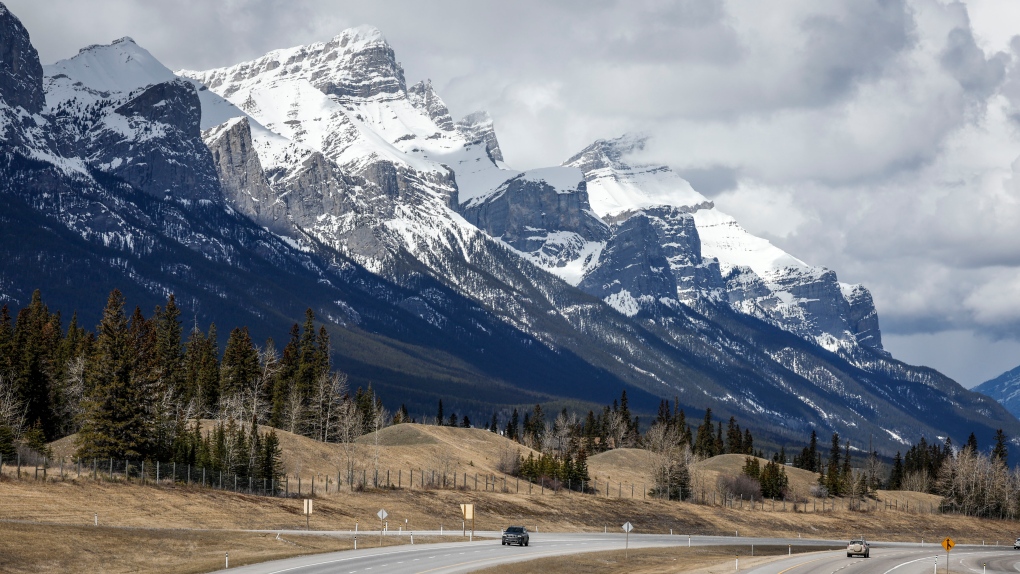Early snowmelt in Western mountains means drier summers, more wildfire risk: study
 Traffic travels along the Trans Canada Highway past Mount Rundle of the Rocky Mountains near Canmore, Alta., Monday, April 24, 2023.THE CANADIAN PRESS/Jeff McIntosh
Traffic travels along the Trans Canada Highway past Mount Rundle of the Rocky Mountains near Canmore, Alta., Monday, April 24, 2023.THE CANADIAN PRESS/Jeff McIntosh
VANCOUVER - Leaner snowpack in Western Canada and United States mountain ranges is causing drier summers and increasing wildfire risk, says a new study from the University of Colorado Boulder.
Lead author Kate Hale said her team analyzed mountain snow data and found snowpack water storage decreased more than 25 per cent from 1950 to 2013. This, she said, can be attributed to earlier snowmelt, less snowfall and more rain.
“We actually saw some of the strongest signals up in the Canadian Rockies, by way of this decrease in snowfall and then earlier snowmelts and rainfall generation,” Hale said in an interview.
Snowmelt serves as the primary water resource in western mountain regions, the study says. The ranges store snow throughout the winter, which then melts during spring and summer months when demand for water peaks.
Hale said snow in these regions typically wouldn't start melting until late May or June, but has begun showing signs of snow thawing as early as March.
Such a shift in snowmelt may pose challenges for residents as much of the infrastructure in these regions were designed to adapt to when water becomes available, Hale said.
“The snowmelts are providing most of the downstream water resources, such that if there is more snowmelt occurring earlier in the year, that means there will be less available for later in the year,” she said.
Holly Chubb, a climate researcher at the University of British Columbia, agreed, saying a serious decline in the snowpack would cause “cascading issues” for energy security in B.C.
“We rely on hydroelectric power as a major source to power our businesses, our homes and our schools, and the hydroelectric power is generally fed from the glacier, which fills our reservoirs,” she said in an interview.
“We may have to really adjust our usage, our consumption, and think about actually how we are utilizing hydro power in B.C.”
She said changes in snowmelt may impact soil and lead to an increase in the size and duration of wildfires.
It could also disrupt wildlife, she added. For instance, she said early snowmelt could shift the volume and temperature of rivers, which could prevent fish from spawning and reduce the province's salmon population.
“All of this information about the timing of snow melting is really, really essential to our cultural, economic and general energy security in British Columbia,” she said.
She suggested governments follow advice from Indigenous leaders.
“They have seen the changes in this landscape for thousands of years,” she said. “They have a deep knowledge and relationship with the land, with salmon, with bears that we do not have and that knowledge system is incredibly valuable.”
This report by The Canadian Press was first published May 28, 2023.
This story was produced with the financial assistance of the Meta and Canadian Press News Fellowship.
CTVNews.ca Top Stories

More than 115 cases of eye damage reported in Ontario after solar eclipse
More than 115 people who viewed the solar eclipse in Ontario earlier this month experienced eye damage after the event, according to eye doctors in the province.
Last letters of pioneering climber who died on Everest reveal dark side of mountaineering
George Mallory is renowned for being one of the first British mountaineers to attempt to scale the dizzying heights of Mount Everest during the 1920s. Nearly a century later, newly digitized letters shed light on Mallory’s hopes and fears about ascending Everest.
Toxic testing standoff: Family leaves house over air quality
A Sherwood Park family says their new house is uninhabitable. The McNaughton's say they were forced to leave the house after living there for only a week because contaminants inside made it difficult to breathe.
An emergency slide falls off a Delta Air Lines plane, forcing pilots to return to JFK in New York
An emergency slide fell off a Delta Air Lines jetliner shortly after takeoff Friday from New York, and pilots who felt a vibration in the plane circled back to land safely at JFK Airport.
B.C. seeks ban on public drug use, dialing back decriminalization
The B.C. NDP has asked the federal government to recriminalize public drug use, marking a major shift in the province's approach to addressing the deadly overdose crisis.
Sophie Gregoire Trudeau on navigating post-political life, co-parenting and freedom
Sophie Gregoire Trudeau says there is 'still so much love' between her and Prime Minister Justin Trudeau, as they navigate their post-separation relationship co-parenting their three children.
Decoy bear used to catch man who illegally killed a grizzly, B.C. conservation officers say
A man has been handed a lengthy hunting ban and fined thousands of dollars for illegally killing a grizzly bear, B.C. conservation officers say.
'I was scared': Ontario man's car repossessed after missing two repair loan payments
An Ontario man who took out a loan to pay for auto repairs said his car was repossessed after he missed two payments.
Powerful tornado tears across Nebraska, weather service warns of 'catastrophic' damage
Devastating tornadoes tore across parts of eastern Nebraska and northeast Texas Friday as a multi-day severe thunderstorm event ramped up in the central United States, injuring at least three people.































